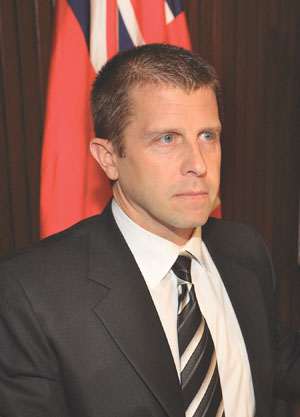
Visitors to the Ontario ombudsman’s web site will immediately see a harsh greeting indicating André Marin’s pitched battles with a number of Ontario municipalities over their co-operation with his office’s investigations.
 “Which city council in Ontario has the dubious distinction of being ‘the least co-operative body’ the Ontario Ombudsman has ever investigated, due to council members’ reluctance to comply with Ombudsman investigative processes?” a note on the web site asks.
“Which city council in Ontario has the dubious distinction of being ‘the least co-operative body’ the Ontario Ombudsman has ever investigated, due to council members’ reluctance to comply with Ombudsman investigative processes?” a note on the web site asks.
The answer, according to the link, which itself takes visitors to a related report and a letter of inquiry, is the municipal council in Sudbury, Ont. But Marin’s office has had issues with other municipalities as well.
How councils conduct their business, particularly when they decide to meet behind closed doors, doesn’t rank as one of the top-five issues behind the 18,500 complaints made to the ombudsman’s office every year.
In fact, the investigative body estimates there are about 100 complaints regarding closed-door meetings during the course of a year. But it has become a significant area of concern for Marin’s office.
Marin is in the throes of finalizing his first report on cases of municipal closed-door meetings that he’s expected to release by the end of October.
It will chronicle the types of cases the office has dealt with during the past year along with the main problems it has encountered since its open-meeting law enforcement team began in 2008.
The ombudsman is the default investigator of closed-door meetings for the 191 Ontario municipalities that don’t have their own investigator.
While the ombudsman found Sudbury’s council was justified in its closed-door meetings, he was obviously not happy with the actions of individual council members.
“The fact that only four of the 14 individuals we asked to interview were prepared to co-operate with my office is an affront to the citizens of Sudbury,” Marin said in his report. “The abysmal co-operation level of this city council has offended the Ombudsman Act.”
Marin faced similar difficulties in London, Ont., as well. “In both London and Sudbury, we faced some challenges from councillors who objected to aspects of our process,” said Marin in e-mailed responses to questions from Law Times.
“Some councillors even refused to speak to our investigators because they objected to my use of Twitter. In London, a few councillors objected to the fact that the identity of people who complain to our office is kept confidential.
They spoke of wanting to face their ‘accusers’ and of feeling like they had been ‘charged.’”
Awareness of the work his office does is key, so Marin and his team have offered to make presentations to municipal councils.
They’ve already spoken to London’s council and have trips planned for Sudbury and Midland, Ont. He points out that no charges or findings of guilt result from his investigations and notes councils are free to reject his recommendations.
John Mascarin, a municipal and land-use planning lawyer at Aird & Berlis LLP, acknowledges the need for members of councils to occasionally meet behind closed doors.
“Municipal councils go in closed sessions all the time and almost always for justifiable and legitimate reasons,” he says.
“I acknowledge that there appears to be a greater push for transparency and accountability. But I maintain that there is nothing inherently wrong with a council deciding that some matters . . . [are] better discussed in a venue other than an open public forum.”
In the Sudbury case, some council members refused to talk to ombudsman investigators without having a lawyer present. Mascarin says he understands that legal representation isn’t necessary but suggests that those who do want to have a lawyer present should be able to do so.
"I understand and appreciate the ombudsman’s position but I believe that a witness is entitled to have legal counsel present if he or she requests it, notwithstanding that the investigation may be only a fact-finding exercise and not be adversarial in nature,” he says.
“I am not saying that lawyers should be part of the process, only that they may be part of the process if so requested by a witness.”
For Marin, the issue is a difficult one. He generally discourages the presence of lawyers. His point is that councillors are under no legal jeopardy during interviews and are merely witnesses in the investigation.
He’s particularly firm when it comes to the question of having the municipality’s own lawyers present, something that happened in the Sudbury case. “Allowing the city solicitor to sit in on our investigators’ interviews is totally out of the question,” he said.
“The city solicitor is conflicted. You cannot represent the city’s interests and the interests of all councillors collectively without compromising all of them.”
Representatives for the Sudbury and London councils didn’t respond to requests for comment.